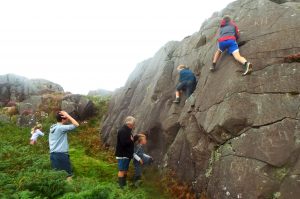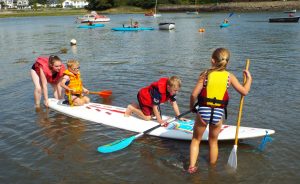The time has come for another reflection on the holiday experiences of the family of Mill Grove in our beloved North Wales. We have been there every year since 1976 and if anything the wonder, excitement and discoveries have grown rather than diminished with each passing stay. Now children and grandchildren of those who were there as little ones are discovering and exploring the very same beaches, rivers, slabs, crags, pools, mountains and seas as their predecessors.
 I would like to focus on just two days we had together, and then to describe the sheer joy of the spontaneous sharing about holidays past. The first day was on the local mountain, Moel-y-Gest. Fifteen or so walked to the summit ridge of this modest but striking hill, led by one of the youngsters on a dry, but unexceptional morning. On arriving at the triangulation point we took the traditional photos and then began to look around: west along the Lleyn peninsular, south beyond the Harlech dome, and North and East towards the mountains and valleys of Snowdonia National Park. We had a picnic lunch on some rocks that provided shelter from the Westerly breeze, and then there was no hurry to descend. In fact by design there was ample time for the youngsters to enjoy the local boulders and rocky outcrops that form part of the summit plateau.
I would like to focus on just two days we had together, and then to describe the sheer joy of the spontaneous sharing about holidays past. The first day was on the local mountain, Moel-y-Gest. Fifteen or so walked to the summit ridge of this modest but striking hill, led by one of the youngsters on a dry, but unexceptional morning. On arriving at the triangulation point we took the traditional photos and then began to look around: west along the Lleyn peninsular, south beyond the Harlech dome, and North and East towards the mountains and valleys of Snowdonia National Park. We had a picnic lunch on some rocks that provided shelter from the Westerly breeze, and then there was no hurry to descend. In fact by design there was ample time for the youngsters to enjoy the local boulders and rocky outcrops that form part of the summit plateau.
And it is that period, seemingly timeless but actually over an hour, that lingers in the memory. All of the children and young people were engaged in a process which combined trying to find new routes up the rocks, with shared discoveries of ways round and down them. At times they did so as individuals, oblivious to what others were doing. At other times they compared notes, or occasionally asked for help or advice, usually from each other. The adults chatted nearby in a very relaxed mode, clearly interested in what was going on, but not in any way governed by, or responsible for it. Some children chose to attempt harder routes, and to do them more quickly; others were happy scrambling in the heather and perching themselves at the top of slabs. It was a wholly contented and enjoyable experience for all. The personal dynamics were trouble-free, and the interaction with the natural world was a pleasure to witness. I felt privileged to have been present to savour such unalloyed, enthusiastic and extempore enjoyment.
 A few days later we were at sea level, in the harbour of Borth-y-Gest, to be precise and it was nearing a spring high tide. It was a perfect day: a cloudless sky, and the water sheltered from the westerly breeze by the headland. There was the usual hive of activity that goes with a high tide by a slipway, with various types of dinghies, boats and canoes being launched. The same group of Mill Grove family was now on the slipway putting three kayaks and one sailboard into the water. Each person had a buoyancy aid and several had wetsuits. The adults were once again relaxed and chatting with each other, as well as with people and families who were enjoying the sun-drenched water directly or indirectly.
A few days later we were at sea level, in the harbour of Borth-y-Gest, to be precise and it was nearing a spring high tide. It was a perfect day: a cloudless sky, and the water sheltered from the westerly breeze by the headland. There was the usual hive of activity that goes with a high tide by a slipway, with various types of dinghies, boats and canoes being launched. The same group of Mill Grove family was now on the slipway putting three kayaks and one sailboard into the water. Each person had a buoyancy aid and several had wetsuits. The adults were once again relaxed and chatting with each other, as well as with people and families who were enjoying the sun-drenched water directly or indirectly.
And that’s about it! For the best part of two hours the youngsters played in and on the water, “messing about in boats” (to quote Water Rat from The Wind in the Willows). Some were competent at kayaking; others were not. Some were used to swimming; others were new to being in the sea. It was completely unscripted and spontaneous. The adults were present and alert to the need to ensure that no one drifted inadvertently into the main channel as the tide ebbed, but that was done without words: just an occasional swim and a little encouragement. The fun and games became more boisterous and adventurous, until the sailboard was overladen and tipped everyone into the water. Two teenagers set off to see if they could walk across the harbour to the other side: they couldn’t! And then as the tide emptied the harbour two of the young people started a mud slide, and soon several were caked in pretty clingy, slimy mud from head to foot.
It would be unfortunate to dispel the sheer enjoyment and fun that was had on these two occasions by analysis. Keats poem, Lamia is an unforgettable warning against this:
“Do not all charms fly
At the mere touch of cold philosophy?
There was an awful rainbow once in heaven:
We know her woof, her texture; she is given
In the dull catalogue of common things.
Philosophy will clip an Angel’s wings,
Conquer all mysteries by rule and line,
Empty the haunted air, and gnomèd mine—
Unweave a rainbow…”
But the most cursory reflection on the two sets of experiences, on the mountain and in the harbour, reveals that certain simple elements went into creating the space for such unfettered and spontaneous fun. There were carefully chosen settings and times; the children and young people were enthusiastic about the activities and had chosen to do them; there was the appropriate knowledge and equipment; there were adults at hand but not obtruding; and there was a shared understanding about the nature and limits of what was going on. It seems to me that any therapeutic context or experience will embody or replicate in some way exactly these components. Let’s be clear about it: the times on the hill and in the water were not set up to be therapeutic sessions! Far from it. They were all about holiday fun chosen by the children. But the essence of life at Mill Grove is the creation of an environment where therapeutic activity and relationships, personal and group is embedded in the warp and woof of everyday life and the seasons of the year.
This leads us conveniently to the spontaneous sharing about times past. There is a tradition in the family that means we keep a diary or scrapbook of every holiday. These will usually be a single volume per year, but can reach as many as three for one summer. They are compiled or edited by one of the adults or older children, but crucially everyone is invited to make a contribution, however rudimentary or small. The entries range from post cards and brochures, to pictures, maps, diagrams, poems, drawings and paintings. For the first time that I can recall we decided to take a set of old scrapbooks with us to North Wales (about thirty volumes spanning fifteen years or so). In doing so, I had little idea what might happen, if anything. It just seemed to me a bit of a waste that they were stored carefully in London with only rare forays into the cupboard in which they were kept, by someone wanting to check a particular year or holiday.
In the event nothing prepared me for what happened. It started slowly, but then gathered pace as first one, and then another person from the youngest to the oldest began to dip into the pages, and before long there was a continuous flurry of individual discoveries and shared reflections. There were people in the room who had contributed to diaries thirty years before; there were photos of adults when they were young children, and there were pictures of the very places that we knew and loved so well (yes, you’ve got it, including the harbour and the hill!). We realised that we were privileged to be part of an extended family with shared experiences and traditions, and that we valued the past as well as the present. We were part of a shared narrative and story.
Over several decades there has been an awareness of the importance of a child or young person having a secure grasp of her own “life story”. This can be nurtured in various ways, but the holiday diaries brought new light to bear on the nature of this process. And in case you were wondering, yes, we did keep a diary of 2017, and it is bursting at the seams. I can imagine future generations revelling in it at some stage, not as part of a planned process of study or reflection, but simply as a result of a spontaneous suggestion or enquiry. The times on the hill, at the harbour, and in the front room where we enjoyed the diaries together, were all characterised by the very same therapeutic elements. Time past and time present in healthy and creative relationship.
